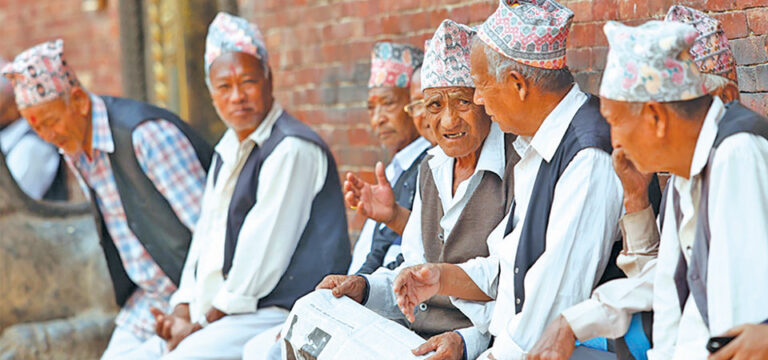
The world on Friday marked the International Day of Older Persons to raise awareness about mental and physical health issues affecting the elderly and the abuses they face. This event also highlights their contribution to society.
This year, the theme of the Day – “Digital Equity for All Ages” – intends to reinforce the need of access and meaningful participation in the digital world by elderly people.
At a time when the world is preparing to raise awareness of the importance of digital inclusion of older persons, many elderly people of Nepal are still striving for the basic human rights, basic healthcare service for dignity and love and affection.
A National Human Rights Commission report shows how the tendency of taking elderlies as a burden is increasing in the Nepali society. They lack love, care and respect from their family members, because of which many of them end up in old-age homes.
There are around 290 old-age homes over the country, of which one is run by the government and some are getting financial assistance.
The human rights watchdog said that factors like family disputes, disintegration, loss of moral education and increasing generation gap are responsible for pushing senior citizens into shelter homes.
The poor financial status and increased level of dependency leave many elderlies vulnerable to abuse, mistreatment and harassment within the family and force them to live in inhuman condition, said Madan Das Shrestha, President of National Senior Citizens Federation.
The concerned stakeholders are worried that the ongoing COVID-19 pandemic has added further woes to this vulnerable group.
Being confined to homes has affected their mental health and lack of regular check-ups might have worsened their chronic conditions, which means they are at risk of diseases and disability and losing quality of life over time, they shared their worries.
“The COVID-19 pandemic has brought about unprecedented fear and uncertainty among all, but the pandemic has primarily remained harsh for elder population,” said Krishna Murari Gautam ‘Chatyang Master’, founding chairman of Ageing Nepal.
Since the aging population is the most vulnerable to the coronavirus threat and its impact, many elderlies have isolated themselves, he said, adding that this has left many of them battling depression and anxiety.
Gautam said that apart from this, reported cases of elderly abuse had also increased during the pandemic. But the elderly hardly report incidences of abuse to the concerned stakeholders for lack of awareness about their rights, poor physical health and lack of social support system.
He highlighted another horrifying fact that unattended bodies of elderlies have also increased during the pandemic.
“In normal days, cases of 10-11 unclaimed bodies of the elderlies used to be reported. But during the pandemic, the country has witnessed a two-fold increase in such cases. They might have died of COVID-19 and were abandoned fearing COVID-19 transmission,” he added.
Gautam and Shrestha both shared their worries about how the most vulnerable population living in care facilities and rural areas are deprived of the vaccination against the coronavirus.
People have to visit vaccination centers where they have to stand in queues. This is not feasible for the elderlies with disabilities and severe illness, they said.
“Older people are prioritised on paper, but not in reality,” they shared.
Gautam and Shrestha are of the view that the government remained widely ignorant towards the elderly, which is estimated to be about 10 per cent of the total population.
The government has introduced many policies and laws to address the issues facing the elderly people; however, it has failed in the implementation part.
When asked about the government plans and policies to safeguard the rights of elderly, Krishna Prasad Parajuli, Joint-Secretary at the Ministry of Women, Children and Senior Citizens, said the government has introduced a number of laws and policies for elderly population.
“The government has introduced 50 per cent concession in transportation fair, free health insurance schemes and is providing monthly social security of Rs. 4,000,” he added.
Furthermore, the government has asked all the government hospitals to set up geriatric wards and is working on a detailed project report for the construction of a well-facilitated 50-bed geriatric hospital, along with the shelter home in Gothatar, Kathmandu.
“One of the basic principles of human rights is that each senior citizen should have the right to live in his/her own home, while anyone with no kin to assist should be cared for by the government,” said Parajuli.
However, Shrestha said none of the hospitals of Nepal have sufficient manpower to run geriatric wards. “There are only eight geriatric doctors in Nepal, of which four have already migrated to alien land. Only a few hospitals, including Patan, Bir, TUTH in Maharjgunj and Pokhara-based hospitals have separated a few beds for senior citizens.”
Source : TRN,





